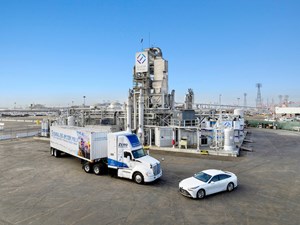News
FuelCell Energy and Toyota complete Tri-gen production system
FuelCell Energy and Toyota Motor North America have announced the completion of the first-of-its-kind Tri-gen system at Toyota's Port of Long Beach operations. The Tri-gen system, owned and operated by FuelCell Energy, produces renewable electricity, renewable H2 and water from directed biogas. FuelCell Energy has contracted with Toyota to supply the products of Tri-gen under a 20-yr purchase agreement.
Tri-gen is an example of FuelCell Energy's ability to scale H2-powered fuel cell technology, an increasingly important energy solution in the global effort to reduce carbon emissions. Tri-gen will enable Toyota Logistic Services (TLS) Long Beach to be the company's first port vehicle processing facility in the world powered by onsite-generated, 100% renewable energy and represents the types of innovative and bold investments the company is making as part of its environmental sustainability strategy.
"By utilizing only renewable H2 and electricity production, TLS Long Beach will blaze a trail for our company," said Chris Reynolds, Chief Administrative Officer, Toyota. "Working with FuelCell Energy, together we now have a world-class facility that will help Toyota achieve its carbon reduction efforts, and the great news is this real-world example can be duplicated in many parts of the globe."
FuelCell Energy CEO Jason Few said, "FuelCell Energy is committed to helping out customers surpass their clean energy objectives. By working with FuelCell Energy, Toyota is making a powerful statement that H2-based energy is good for business, local communities, and the environment. We are extremely pleased to showcase the versatility and sophistication of our fuel cell technology and to play a role in supporting Toyota's environmental commitments."
By supporting TLS operations, the Port of Long Beach, Tri-gen's carbon neutral products are expected to reduce more that 9,000 tpy of CO2 emission from the power grid.
"Renewable H2 is an important fuel for the future of the Port of Long Beach and the shipping industry," said Port of Long Beach CEO Mario Cordero. "The renewable H2 generated by the Tri-gen system that Toyota commissioned, and similar projects, is part of our multi-strategy approach to help fuel the transition of equipment like locomotives, harbor craft, cargo-handling equipment and trucks to zero emissions."
Tri-gen will also help to avoid more than 6 t of grid NOx emissions, which are harmful to people and the environment, and has the potential to reduce diesel consumption by more than 420,000 gpy by using H2-powered fuel cell trucks in port operations.
Additionally, excess electricity not used by TLS will be delivered to the local utility, Southern California Edison, under the California Bioenergy Market Adjustment Tariff program, adding a renewable, resilient and affordable baseload electric generation resource to the electric grid.


